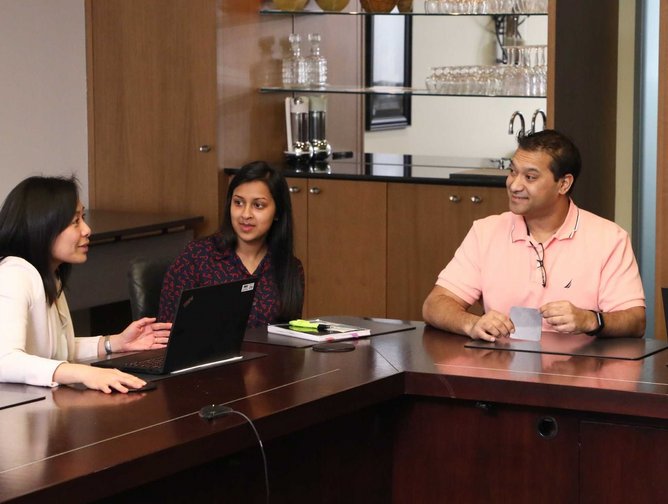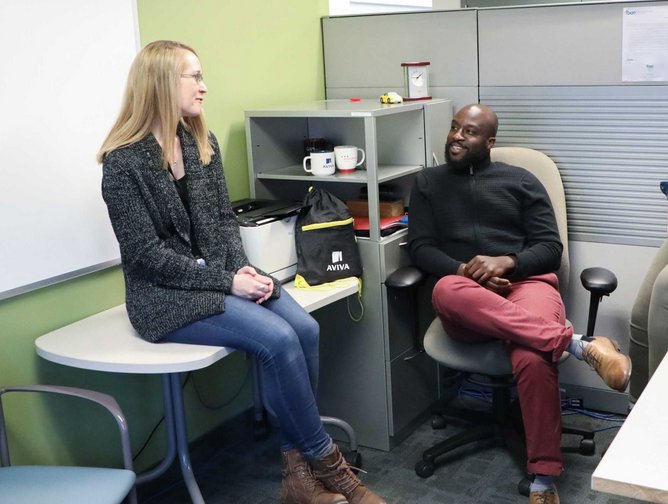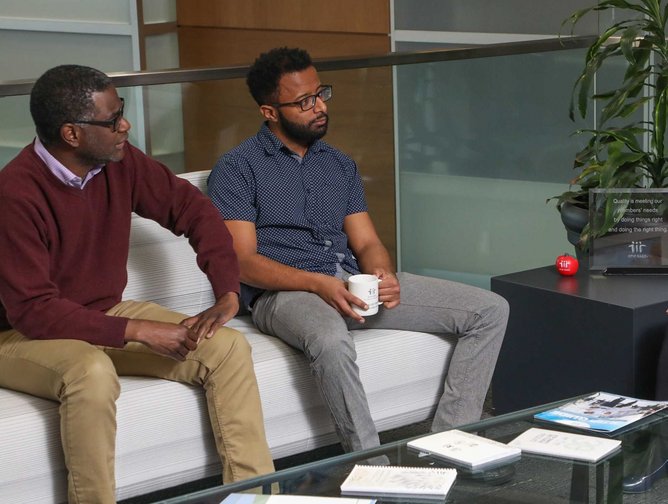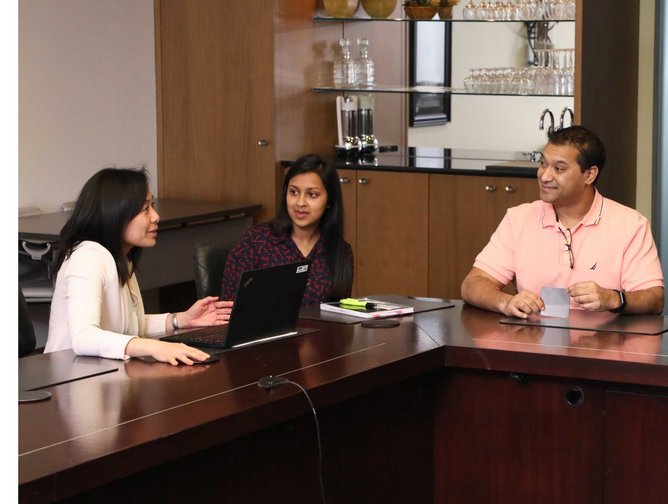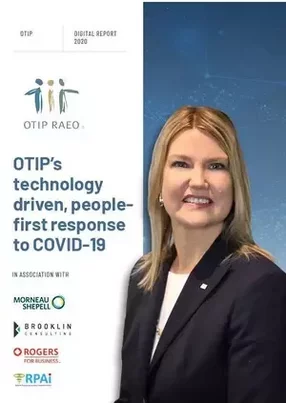OTIP’s technology driven, people-first response to COVID-19
When it comes to the workforce at Ontario Teachers Insurance Plan (OTIP), Stacey Rous, EVP & CFO, shares that the organization understands that staying connected, whether with coworkers or senior leaders, is key. “Creating that sense of community at work is really important, as is the ability to listen and evaluate opinions,” she says. “After anything we do as an organization, we ask for feedback to develop a safe space for people to talk about the organization in a collaborative way. This allows us to be both responsive and agile in an ever-changing world.”
This mindset played a key role in OTIP’s response to COVID-19. Rous believes that relocating the majority of our workforce to home offices has been the biggest disruption to the company from the COVID-19 pandemic. “We moved more than 600 people into home offices in less than two weeks, moving them onto a technology platform that is compatible with working from home. Protecting the health and well being of our employees was top of mind, but at the same time we managed to accomplish this task while maintaining our service to members.”
Achieving this incredible feat was not easy, and not done alone. Rous says that OTIP’s partners and stakeholders have been vital in adopting this work from home strategy. “Prior to COVID-19 we didn’t have the system capacity for everyone to work from home. We had been planning for 20 to 25%, but certainly not 100%. Our partners really stepped up to help us implement this capability once the healthcare sector was under control, allowing us to stay connected to our employees and members.”
Rous adds that she is extremely proud of how OTIP’s employees have adapted, driving new ways of connecting with its members, clients and employees, but at the same time not exhausting them with the technology. “Our members and our management teams are very accepting that there may be children in the background, dogs barking or doorbell rings from home deliveries, which previously would have been considered very unprofessional.”
She adds that the insurance industry itself has not escaped impact from the pandemic. “Our industry is under extreme financial pressure. People’s driving habits have changed, and there is an expectation that auto premiums will reduce accordingly. At the same time, the closure of things like dental offices and other health providers creates a mountain of questions for us and our members on how we handle things like claim limits, cancelled procedures and benefit premiums during and after the pandemic.”
Rous believes that technology will be key as COVID-19 continues to change how organizations and the insurance industry continues to operate. Post pandemic, she says, a digital mindset should be seen as a way of doing business, whether that be on-line virtual doctor’s appointments, or using Telehealth and Telemedicine more proactively. “COVID-19 should teach us that it's okay to do some things digitally. We need to harness what we've learned through this and not go back to the old normal where it doesn’t make sense. Many of these technologies are so powerful, and they will be cost effective for both our community and our healthcare system .”
While Rous thinks that we are a long way from a post COVID-19 world, she does believe that “we are entering into a new normal and that the industry is going to have to settle. For me the future is about the financial stability of a company going forward. I think the finance and the tech folks are going to have their hands full for quite some time.”
Technology trends in insurance
Looking past the current pandemic, Rous highlights that digital innovation, artificial intelligence (AI) and data are still the overriding trends in the insurance industry, adding that “these are the technologies that allow us better understand and service our members.”
She details that, at the core, OTIP’s digital transformation strategy is designed to streamline communication and harness data analytics, using a data warehouse and data mapping to provide a seamless service to its members. “This is something that is still ongoing for us at OTIP. We have only just scratched the surface of this journey, however, the recent hiring of a new director of data and digital technologies supported by a dedicated team is going to allow us to really grow this potential.”
When it comes to adopting innovative technology to drive this strategy, Rous explains that the organization started using robotics in collaboration with RPAI and Blue Prism Software. “We were one of the first in Canada in 2016 using robotics to reduce the amount of non-value-added tasks from our people,” she explains. For OTIP, Rous continues, the use of robotics is seen as an extension of its workforce. “Our employees like it because they can focus on the value-add work for our members.”
Rous continues, saying that even though OTIP was one of the first in Canada to use robotics, it was doing very small projects. “We were more in the investigation stage, using it to understand how our members wanted to do business with us. Now, with our new director and dedicated team, we are ramping up our innovation and adoption of robotics for automation.”
With regards to developing these technologies, Rous stresses the importance of strategic partnerships. “Our strategic partnerships with Rogers, our internet provider, or Central Logic, lay the foundation and our insurance partners like Morneau, Manulife, Economical and Aviva, are all intertwined. We don’t want to build our own tech, we want to build our own intelligence around our members with the help of the technology our strategic partners provide. You don't need to own those technologies, you need to leverage those technologies.”
Women in tech
Rous believes strongly in the inclusion of women in tech, a mindset that is shared by the entire organization. “From a woman in tech perspective, we have a number of BSA and data specialists - at least 50% - that are women, which we are doing very well in,” she explains. “On the traditional side of tech, such as networking systems, the figures are slightly less with about 25% being women.”
Outside of the working environment, Rous explains that the organization has key people helping young girls learn code, known as girls for coding, to promote females joining the industry. “However, I think it is still a generation away. Currently schools are working to get the materials needed to show girls the opportunities within the STEM industry, but it is going to take time for young girls to see themselves as coders.”
Rous, seen by many as a leader and a mentor herself, shares that she did not get where she is today by herself. “My best advice for girls and women looking to get into tech is to seek out a mentor or coach in the industry. I cannot underscore the importance of finding people to help you through your career. Gender isn’t important here. It is about finding people who you trust and are willing to help you navigate the challenges you will face in this industry. Don't try and do it alone. You need people out there advocating for you.”
What the future holds
Returning to the organization’s strategy, Rous reiterates that regardless of COVID-19 or changes in technology, OTIP’s member-first approach has not changed. “We are a people-first organization. There will always be tweaks to how we work, but our core strategy of ‘people first’ has not and will not change.” Throughout the pandemic, OTIP has been active in the communities it serves, donating more than $250,000 to food banks and mental health associations across Canada. “I'm on the Canadian Mental Health Association of Waterloo Wellington and a recent study highlighted that 70% of us are feeling isolated due to that lack of connectivity, which is having a detrimental effect on all our mental health right now.”
In addition, she continues, 70% of those same survey respondents said they were concerned about becoming sick from COVID-19, or losing someone close to it. “This crisis remains at the top of everyone’s mind. Given the corresponding mental health challenges we are going to see from an industry perspective, we need to be ready to help the people that maybe unwell, and be there for both employees and members to help them.”
